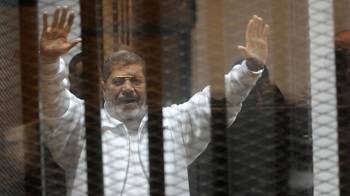Ousted Egyptian President Mohamed Morsi said Sunday during a court session that the Muslim Brotherhood, the group from which he hails, had no role in episodes of political violence that erupted in the wake of a 2011 popular uprising which toppled autocratic President Hosni Mubarak.
Morsi said from the defendants dock that Egypt's Supreme Council of the Armed Forces, which had taken charge of the country's affairs after Mubarak stepped down in February of 2011, was responsible for the killing of hundreds of protesters in the wake of the uprising up until the leader was elected President in the summer of 2013.
Morsi told the judges that some witness accounts from a fact-finding commission he had created during his tenure revealed that the military intelligence apparatus, led by current President Abdel-Fattah al-Sisi at the time, had been behind orders given to security forces to kill pro-democracy protesters during the transitional period.
"I was not a gang leader," Morsi said. "I was president."
He went on to say that he had opted not to punish military intelligence leaders during his single-year rule in order to "preserve" the military institution.
"I wanted the perpetrators to be brought to trial in a legal and constitutional manner," Morsi said, adding that he had submitted the fact-finding commission's report to prosecutors.
Morsi said he was "surprised" by the military's move to oust him and suspend the constitution on July 3 of 2013 after three days of massive opposition protests.
"I was taken to [eastern Cairo's] Republican Guard's Club and I stayed there for two days until I was taken to a military facility in Alexandria," Morsi said of the events following his ouster.
He said that six republican guard officers were presided over his detention at the military facility until his transfer to prison in November of 2013.
He added that the only visitors he was allowed to see during his detention by the military were the EU's chief diplomat Catherine Ashton and former Malian President Alpha Omar Konare, who led an African panel tasked with assessing developments in Egypt.
He went on to say that he had refused to respond to investigators who visited him in his detention at Alexandria's military facility.
Morsi and 35 co-defendants, including leading members of his Muslim Brotherhood group, face charges of "conspiring" with Palestinian resistance group Hamas and Lebanon's Hezbollah to carry out "terrorist acts" inside Egypt.
Morsi and his co-defendants emphatically deny all the charges against them, which they insist are politically driven.
Egypt's first-ever democratically elected leader, Morsi was ousted by the military in July of 2013 following massive opposition protests after a single year in power.
He currently faces multiple criminal charges, including incitement to murder, jailbreak and "offending Egypt's judiciary."
Al-Sisi, who was appointed defense minister by Morsi in the summer of 2012, played a key role in his ouster before “winning” a presidential election in May of last year.
PHOTO CAPTION
Egypt's deposed president Mohamed Morsi waves from inside the defendant’s cage during his trial at the police academy in Cairo on January 8, 2015
Worldbulletin


 Home
Home Discover Islam
Discover Islam Quran Recitations
Quran Recitations Lectures
Lectures
 Fatwa
Fatwa Articles
Articles Fiqh
Fiqh E-Books
E-Books Boys & Girls
Boys & Girls  Hajj Rulings
Hajj Rulings Hajj Fatwas
Hajj Fatwas














